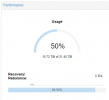TLDR: Ceph vs ZFS: advantages and disadvantages?
Looking for thoughts on implementing a shared filesystem in a cluster with 3 nodes.
They all serve a mix of websites for clients that should be served with minimal downtime, and some infrastructure nodes such as Ansible and pfSense, as well as some content management systems.
The intention is to have Hight Availability between the nodes, as when one is unreachable, it (seamlessly?) moves the VMs to a failover. For that, it's required to have a shared filesystem, so considering between Ceph and ZFS at the moment.
There's already disks and corresponding volumes on each of the nodes for the OS, general VMs and backups. Each of the nodes also has 2 x 200GB SAS SSDs in Raid0. These are intended to have the VMs which should be in the High Availability configuration.
So I was wondering what would be the advantages of choosing one over the other, are they even possible to compare side by side? I have read a few threads and some documentation, have had a few experiences too, and some opinions coming in. Tradeoffs? Anything you may point out that can be taken as a starting point? Would appreciate any input you may have.
Looking for thoughts on implementing a shared filesystem in a cluster with 3 nodes.
They all serve a mix of websites for clients that should be served with minimal downtime, and some infrastructure nodes such as Ansible and pfSense, as well as some content management systems.
The intention is to have Hight Availability between the nodes, as when one is unreachable, it (seamlessly?) moves the VMs to a failover. For that, it's required to have a shared filesystem, so considering between Ceph and ZFS at the moment.
There's already disks and corresponding volumes on each of the nodes for the OS, general VMs and backups. Each of the nodes also has 2 x 200GB SAS SSDs in Raid0. These are intended to have the VMs which should be in the High Availability configuration.
So I was wondering what would be the advantages of choosing one over the other, are they even possible to compare side by side? I have read a few threads and some documentation, have had a few experiences too, and some opinions coming in. Tradeoffs? Anything you may point out that can be taken as a starting point? Would appreciate any input you may have.


